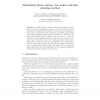Free Online Productivity Tools
i2Speak
i2Symbol
i2OCR
iTex2Img
iWeb2Print
iWeb2Shot
i2Type
iPdf2Split
iPdf2Merge
i2Bopomofo
i2Arabic
i2Style
i2Image
i2PDF
iLatex2Rtf
Sci2ools
100
click to vote
MICAI
2005
Springer
2005
Springer
Maximizing Future Options: An On-Line Real-Time Planning Method
Abstract. In highly dynamic environments with uncertainty the elaboration of long or rigid plans is useless because the constructed plans are frequently dismissed by the arrival or new unexpected situations; in these cases, a “second-best” plan could rescue the situation. We present a new real-time planning method where we take into consideration the number and quality of future options of the next action to choose, in contrast to most planning methods that just take into account the intrinsic value of the chosen plan or the maximum valued future option. We apply our method to the Robocup simulated soccer competition, which is indeed highly dynamic and involves uncertainty. We propose a specific architecture for implementing this method in the context of a player agent in the Robocup competition, and we present experimental evidence showing the potential of our method.
Artificial Intelligence | Future Option | MICAI 2005 | Planning Methods | Real-time Planning Method |
| Added | 28 Jun 2010 |
| Updated | 28 Jun 2010 |
| Type | Conference |
| Year | 2005 |
| Where | MICAI |
| Authors | Ramón F. Brena, Emmanuel Martinez |
Comments (0)

